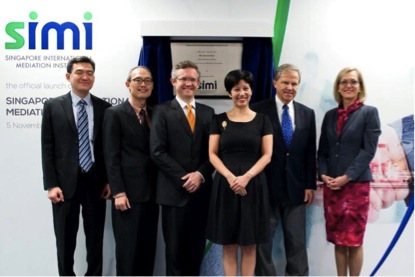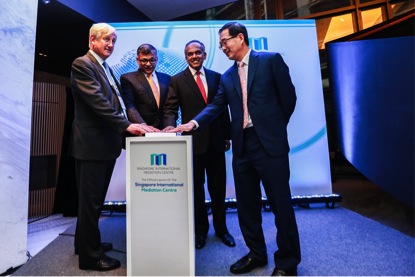Author’s Note: I would like to thank Ms. Eunice Chua, Deputy Chief Executive Officer for her contribution to this entry.
5 November 2014 was a momentous day for mediation in Singapore. It saw the launch of two mediation-related bodies, the Singapore International Mediation Institute and the Singapore International Mediation Centre.
In April 2013, Singapore’s Chief Justice Sundaresh Menon and the Ministry of Law (MinLaw) appointed the International Commercial Mediation Working Group which was co-chaired by George Lim (Senior Counsel) and Edwin Glasgow (Queen’s Counsel) and comprised academics, practitioners, in-house counsel and other stakeholders in the mediation field.
The remit of the working group was to “assess and make recommendations on how to develop Singapore into a centre for international commercial mediation, having regard to the current development of mediation in Singapore, and to Singapore’s position as a prominent international business centre”.
The working group delivered its report in late 2013 and of its recommendations, one was to establish a professional body to set standards and provide accreditation for mediators. The other was to establish an international mediation service provider with a quality panel of international mediators and experts and a host of user-centric products and services.
These twin recommendations gave birth to the Singapore International Mediation Institute (SIMI) and the Singapore International Mediation Centre (SIMC) respectively.
Singapore International Mediation Institute (SIMI)
The SIMI was launched by Ms Indranee Rajah (Senior Minister of State, Ministry of Law and Ministry of Education) and Professor Simon Chesterman (Dean, Faculty of Law, National University of Singapore) and was attended by local and international lawyers, local and international mediators and academics.
The SIMI is a non-profit organisation founded by the National University of Singapore with support from the Ministry of Law. The Board is chaired by Associate Professor Joel Lee (Faculty of Law, National University of Singapore) and assisted by his Deputy-Chair Mr. Michael Leathes (Board, International Mediation Institute). The Board members comprise Ms Josephine Hadikusumo (Regional Legal Counsel, Texas Instruments), Professor Nadja Alexander (Conflict Resolution Specialist, Mediator based in Hong Kong) and Mr Poon Hong Yuen (Deputy Secretary, Ministry of Law).
The SIMI’s key functions include setting world-class standards of mediation, managing mediator accreditation, promoting mediation through sharing information and building awareness and furthering education and research in mediation.
One key idea behind setting world-class mediation standards and managing an accreditation scheme according to those standards is to increase user confidence in mediation services providers and mediators in Singapore. To this end, the SIMI is working closely with its partners such as the International Mediation Institute, to ensure that the SIMI captures and continues to be updated with the best mediation practices adopted worldwide and that SIMI mediators have both the competence and experience according to those standards.
As a professional standards setting body, the SIMI will not be providing mediation services or running courses that will lead to a SIMI qualification. It therefore functions independently from mediation service and training providers and will provide users a neutral and independent yardstick by which to measure mediation services.
In terms of outreach, given the SIMI’s status as a neutral and independent standards body, it is in a unique position to promote mediation to both users and mediators alike. The SIMI will provide impartial information about mediation and will assist users to assess whether their dispute is appropriate for mediation or some other form of dispute resolution. Users can also select from SIMI Mediators to facilitate their dispute. Mediators will benefit from mentoring and continuing development programmes that will help them develop their skills and experience.
Finally on education and research, the SIMI can leverage on its relationship with the National University of Singapore by instilling an early awareness of mediation and its advantages in law students through activities and competitions. The SIMI will also seek to further research and thought leadership in mediation.
Singapore International Mediation Centre (SIMC)
SIMC was launched by Chief Justice Sundaresh Menon and the Minister of Law, Mr K Shanmugam SC, and was similarly attended by local and international mediators, arbitrators, dispute lawyers, corporate counsel, and representatives of chambers of commerce.
SIMC is a non-profit company which has its offices at Maxwell Chambers. The Board is chaired by Edwin Glasgow (Queen’s Counsel) and assisted by Deputy-Chair Mr. George Lim (Senior Counsel). The Board members comprise Mr. Lucien Wong (Chairman and Senior Partner, Allen & Gledhill LLP), Mr. John Pyall (International Claims Co-ordinator, Munich Re), Professor Lawrence Boo (Head, Arbitration Chambers), Mr. Chow Kok Fong (Managing Director, Equitas Corporation), Mr. Poon Hoong Yuen (Deputy Secretary, Ministry of Law) and Mr. Lok Vi Ming (Senior Counsel).
SIMC will fill a gap in Singapore’s suite of dispute resolution services for international disputes. In the Chief Justice’s speech, he acknowledged that “On top of offering top-notch litigation and arbitration services, [Singapore] must position [itself] to offer similarly high-quality and professional services in the areas of mediation and other alternative dispute resolution options”.
SIMC’s panel of mediators is an international group, drawn from 14 countries, including Africa, Asia, Australasia, Europe and North and South America, and able to conduct mediations in 14 languages. These mediators, many of whom attended the launch, will be SIMI Certified Mediators who may also be IMI Certified Mediators or qualify for IMI Certification.
And while SIMC’s focus is primarily on international disputes, SIMC will also benefit mediation practitioners based in Singapore as this will provide opportunities for them to engage in international work.
A unique aspect of SIMC’s services is the offering of an Arb-Med-Arb procedure in partnership with the Singapore International Arbitration Centre (SIAC). Under this scheme, a dispute begins as an arbitration which is adjourned while mediation is attempted. If parties are able to settle their dispute through mediation, their mediated settlement may be formally incorporated in a consent arbitration award. As consent awards, when properly made in extant arbitration proceedings, are accepted as arbitral awards, they are generally enforceable in approximately 150 countries under the New York Convention. If parties are unable to settle their dispute through mediation, the arbitration proceedings will continue with very modest additional time and expense having been incurred.
Singapore is presently already a hub for international commercial arbitrations. With the establishment of the SIMI and SIMC, Singapore has taken a big step towards becoming a hub for international commercial mediations. These are exciting times indeed.
________________________
To make sure you do not miss out on regular updates from the Kluwer Mediation Blog, please subscribe here.





This importance of this achievement is impossible to underestimate.
The creation of SIMC and SIMI, together with UNCITRAL’s consideration of an enforcement convention for mediated settlement agreements, may mean that 2014 will go down as the Year of International Mediation.
Reflexology we’ve got an
inclination to deliver quality programmers to any or all or any our students
through every native and native graduate teachers with teaching experience in
government or personal institutions, and globe experience in their many field
of expertise. Simply visit here on this information processing site
http://www.soha.edu.sg